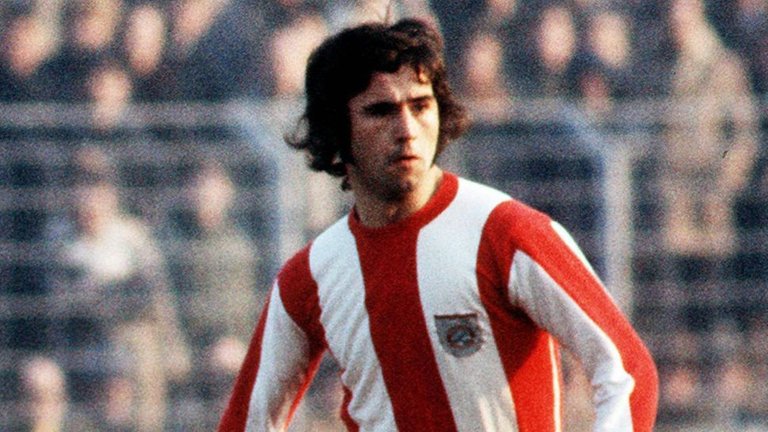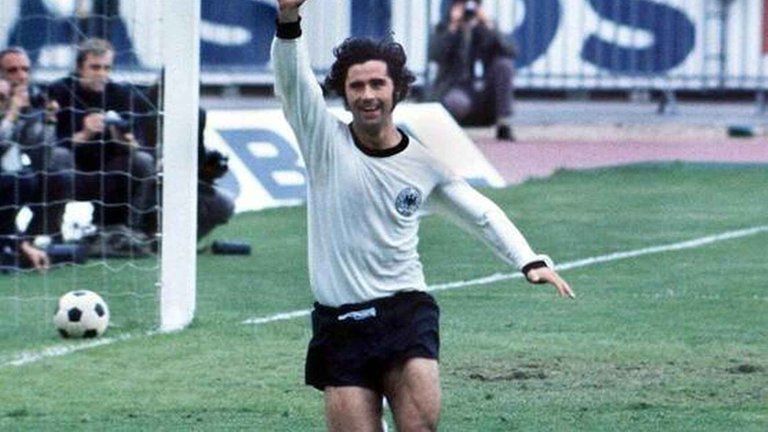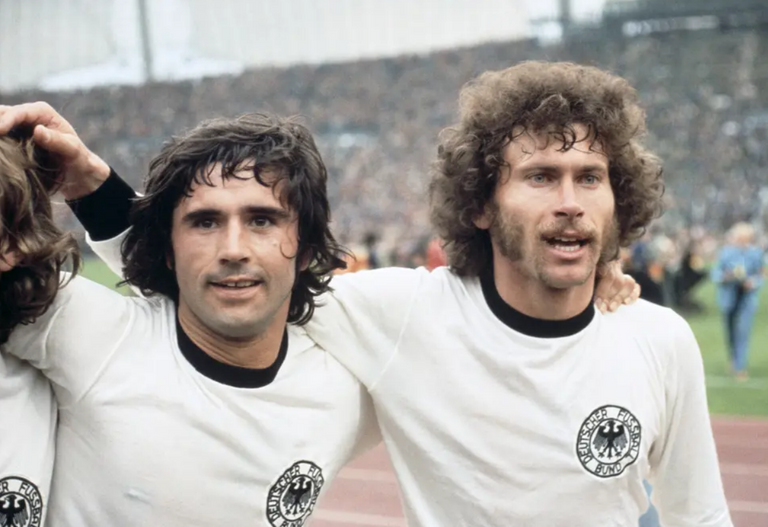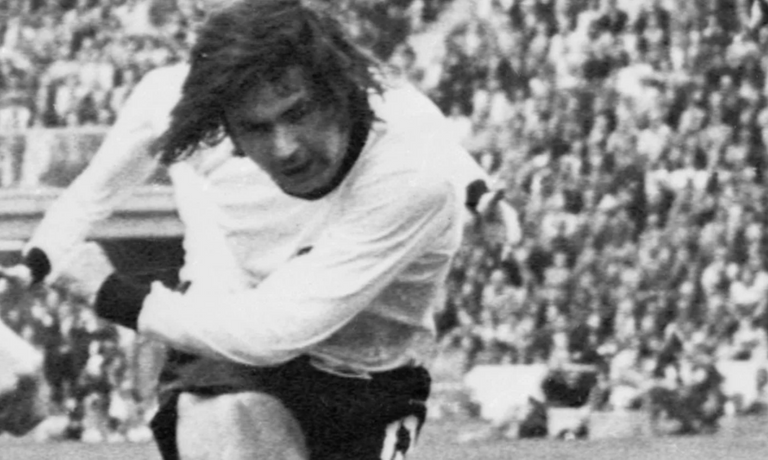[ESP/ENG] Idolos, mitos y leyendas del fútbol mundial: Gerd Müller un goleador de otros tiempos. / Idols, myths and legends of world football: Gerd Müller a scorer of other times.

En estos tiempos de pandemia, que por fortuna lenta y lentamente se van alejando y pasan a ocupar un triste lugar en lo más recóndito de nuestra memoria, nos hemos habituado a estar informados al instante de todo lo que ocurre en el mundo, en tiempo real, ya sea a través de redes sociales o de los restantes innumerables cabales de información que existen hoy en día.
Las limitaciones en las salidas y en los eventos públicos (incluyendo obviamente los deportivos) hacen que nuestra mente tenga una dispersión menor y se nutra preferentemente de noticias on line.
Toda esta introducción tiene como referente una noticia que encontré ayer domingo en muchos medios de información: el fallecimiento de uno de los mejores goleadores en la historia del fútbol mundial. Estoy hablando de Gerd Müller, una verdadera leyenda del fútbol alemán, estrella indiscutida de la selección de su país y un verdadero ídolo para los aficcionados del Bayern Múnich
La noticia fría y breve dice que murió a los 75 años después de luchar durante varios años contra la enfermedad de Alzheimer.

In these times of pandemic, which fortunately slowly and slowly recede and occupy a sad place in the depths of our memory, we have become accustomed to being instantly informed of everything that happens in the world, in real time , either through social networks or the other innumerable sources of information that exist today.
The limitations in the exits and in the public events (including obviously the sporting ones) make that our mind has a smaller dispersion and it is preferably nourished by online news.
This whole introduction is based on a piece of news that I found yesterday Sunday in many media: the death of one of the best scorers in the history of world football. I'm talking about Gerd Müller, a true legend of German football, an undisputed star of the national team and a true idol for Bayern Munich fans.
The short and cold news says that he died at age 75 after battling Alzheimer's disease for several years.

Gerd Müller marcó una época. / Gerd Müller marked an era.
Muchos analistas y periodistas especializados en deportes sostienen que su técnica era comparable a la de Marco Van Basten, ese espléndido jugador que paseó su fútbol y sus goles por toda Europa y que formaba el tridente temible del Milan de Arrigo Sacchi con Ruud Gullit y Frank Rijkaard de finales de los años ochenta.
La diferencia, sutil si se quiere, notable si se analiza en profundidad, es que en realidad el alemán era mucho más goleador que el holandés, a paridad de recursos técnicos.
Después de sus inicios en el T. S. V. Nördlingen pasó al Bayer Munich donde jugó quince años (1963-1978) para cerrar su carrera deportiv en el Fort Lauderdale Striker de los EE. UU. los dos últimos años, de 1979 a 1981, un equipo de Florida ya no milita más en la North American Soccer League desde el 2017.
Podemos decir sin ánimo de exagerar que Gerd Müller marcó una época. Señaló la impresionante cantidad de 661 goles entre el Bayern Munich y la selección de Alemania en 725 partidos, con un promedio de 0,91 goles por partido a lo largo de dieciocho años de carrera deportiva.

Many analysts and journalists specialized in sports argue that his technique was comparable to that of Marco Van Basten, that splendid player who walked his football and his goals throughout Europe and who formed the fearsome trident of Arrigo Sacchi's Milan with Ruud Gullit and Frank Rijkaard from the late eighties.
The difference, subtle if you will, remarkable if you analyze in depth, is that in reality the German was much more goalscorer than the Dutch, at parity of technical resources.
After his start at TSV Nördlingen he moved to Bayer Munich where he played for fifteen years (1963-1978) to close his sports career at Fort Lauderdale Striker in the USA for the last two years, from 1979 to 1981, a team of Florida no longer plays in the North American Soccer League since 2017.
We can say without exaggeration that Gerd Müller marked an era. He pointed to an impressive 661 goals between Bayern Munich and the German national team in 725 games, averaging 0.91 goals per game over his eighteen-year sports career.

Los récords y el nacimiento de la leyenda. / The records and the birth of the legend.
Son varios los récords obtenidos por Gerd Müller que aún subsisten: 365 goles en la Bundesliga, máximo goleador de la misma en siete oportunidades, goleador histórico de la selección de su país (68 goles en 62 encuentros con un promedio de 1,10 goles por partido) hasta el mundial de útbol de Brasil 2014 cuando fue superado por Miroslav Klose (polaco nacionalizado alemán) quien además superó el récord del brasileño Ronaldo como máximo artillero histórico en los mundiales.
El llamado “Bombardero de la Nación” por la prensa alemana logró alcanzar cifras verdaderamente estratosféricas como goleador. Por ejemplo en la campaña 1971/1972 convirtió 40 goles récord aún vigente, ganó cuatro títulos de la Bundesliga, cuatro de la Copa Alemana, una Recopa (certamen que dejó de disputarse en 1999 para dejar más espacio a la actual Champions League) y tres Coipas de Europa (actualmente conocida como Champions League o Liga de Campeones de la UEFA)
Aún en el epílogo de su carrera siguió siendo un formidable goleador. Durante su estadía en tierras estadounidenses en el Fort Lauderdale Strikers marcó cuarenta goles en ochenta partidos. Y ya estaba próximo al retiro. Un promedio de 0,50 gol por partido con 37 años a cuestas.
Ironía de la suerte o predestinación la transferencia de Gerd Müller se convirtó también en la plataforma de lanzamiento del Bayern a los primeros planos del fútbol europeo y mundia.
El Bayern que había sido siempre considerado por el nazismo como el "club de los judíos" había sufrido por ese motivo persecuciones ideológicas de todo tipo que le habían impedido ascender a la Bundesliga y permanecer en ella.
La llegada de Gerd Müller marca una nueva era también en el club alemán. En 26 partidos marca 32 goles.
En el partido que define el ascenso a la Bundesliga se enfrenta con el Tennis Borussia Berlín y lo derrota con un apabullante 8 a 0. Hacían parte de ese quipo otros jugadores que se constituirían en glorias y emblemas del fútbol alemán, no solo del Bayern Munch, como el arquero Seep Meier y el "kaiser" Franz Beckenbauer el eje en el se afirmaría el poderío del equipo alemán en el futuro a nivel nacional y mundial.
Dejó tantos recuerdos que es imposible recogerlos a todos en un solo artículo. Queda en la memoria colectiva tal vez el gol del 2 a 1 contra los Países Bajos en la recordada final del Mundial de Fútbol de 1974 en Alemania.
El equipo alemán de Seep Meier, Berti Vogts (aquél defensor que era un propio mastín), Franz Beckenbauer, capitán y caudillo, Paul Breitner el extraordinario marcador lateral con el african-look enfrentándose al probablemente mejor combinado holandés de todos los tiempos iluminado por la calidad inmensa de un Johan Cruyff capitán y talento al servicio del equipo, Johan Neeskens uno de los mejores centrocampistas del mundo en su época, Reep, Krol y un colectivo donde el conjunto era la fuerza. Todos atacaban y todos defendían.
Cuando apenas iniciado el partido Neskeens pone de penal la ventaja para Paìses Bajos parecía todo dicho. Sin embargo Paul Breitner por la misma via y el siempre presente Gerd Müller le darían el triunfo al equipo alemán. Y su segundo título mundial de la historia.
Nacía una leyenda, demoledora por sus goles. Una leyenda que solo logró vencer ayer el Alzheimer.

Gerd Müller still holds several records: 365 goals in the Bundesliga, top scorer of the Bundesliga seven times, top scorer of his country's national team (68 goals in 62 matches with an average of 1.10 goals per game) until the 2014 World Cup in Brazil, when he was surpassed by Miroslav Klose (Polish nationalized German) who also surpassed the record of Brazilian Ronaldo as top scorer in the World Cups.
The so-called "Bomber of the Nation" by the German press managed to reach truly stratospheric figures as a goal scorer. In the 1971/1972 season, for example, he scored a record 40 goals, won four Bundesliga titles, four German Cup titles, one Cup Winners' Cup (a competition that was discontinued in 1999 to make way for the current Champions League) and three European Cup Winners' Cups (now known as the Champions League or UEFA Champions League).
Even at the end of his career, he continued to be a formidable scorer. During his stay in the United States with the Fort Lauderdale Strikers he scored forty goals in eighty games. And he was already close to retirement. An average of 0.50 goals per game at the age of 37.
Irony of fate or predestination, Gerd Müller's transfer also became Bayern's launch pad into the top echelons of European and world soccer.
Bayern, which had always been regarded by the Nazis as the "club of the Jews", had suffered ideological persecution of all kinds that had prevented them from being promoted to the Bundesliga and remaining there.
The arrival of Gerd Müller also marks a new era for the German club. He scores 32 goals in 26 matches.
In the match that defined promotion to the Bundesliga, he faced Tennis Borussia Berlin and defeated them with an overwhelming 8-0 win. Other players were part of that team who would become glories and emblems of German soccer, not only of Bayern Munch, such as the goalkeeper Seep Meier and the "kaiser" Franz Beckenbauer, the axis on which the power of the German team would be affirmed in the future at national and world level.
He left behind so many memories that it is impossible to collect them all in a single article. In the collective memory is perhaps the goal of the 2 to 1 against the Netherlands in the remembered 1974 World Cup final in Germany.
The German team of Seep Meier, Berti Vogts (that defender who was a mastiff himself), Franz Beckenbauer, captain and leader, Paul Breitner, the extraordinary wing-back with the African-look, facing probably the best Dutch team of all time, illuminated by the immense quality of Johan Cruyff, captain and talent at the service of the team, Johan Neeskens, one of the best midfielders in the world at the time, Reep, Krol and a team where the whole was the strength. Everyone attacked and everyone defended.
When Neskeens scored a penalty kick to give the Netherlands the lead, it seemed all was said and done. However, Paul Breitner and the ever-present Gerd Müller would give the German team the victory. And their second World Cup title in history.
A legend was born, a legend whose goals were devastating. A legend who only managed to beat Alzheimer's yesterday.

El separador y GIF del Logo de HIVE -modificado por el autor del artículo- es cortesía de nuestro estimado usuario @thepeakstudio. a quien va mi agradecimiento.
The HIVE Logo separator and GIF -modified by the author of the article- is courtesy of our dear user [@thepeakstudio.](https://hive.blog/hive-156509/@thepeakstudio/hive-blog-text-animated -dividers-spice-up-your-blog) who goes my thanks.

I upvoted you, thank you for posting! 👍
https://twitter.com/HugoRep/status/1427343399728910339
The rewards earned on this comment will go directly to the person sharing the post on Twitter as long as they are registered with @poshtoken. Sign up at https://hiveposh.com.
¡Enhorabuena!
✅ Has hecho un trabajo de calidad, por lo cual tu publicación ha sido valorada y ha recibido el apoyo de parte de CHESS BROTHERS ♔ 💪
♟ Te invitamos a usar nuestra etiqueta #chessbrothers y a que aprendas más sobre nosotros.
♟♟ También puedes contactarnos en nuestro servidor de Discord y promocionar allí tus publicaciones.
♟♟♟ Echa un vistazo a nuestra cuenta @chessbrotherspro para que te informes sobre el proceso de curación llevado a diario por nuestro equipo.
Cordialmente
El equipo de CHESS BROTHERS
Congratulations @greengalletti! You have completed the following achievement on the Hive blockchain and have been rewarded with new badge(s) :
You can view your badges on your board and compare yourself to others in the Ranking
If you no longer want to receive notifications, reply to this comment with the word
STOPTo support your work, I also upvoted your post!